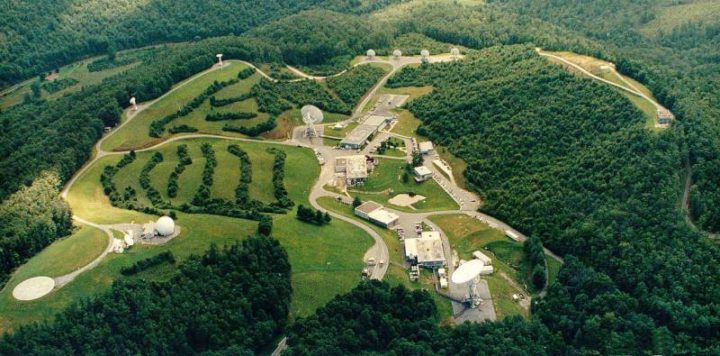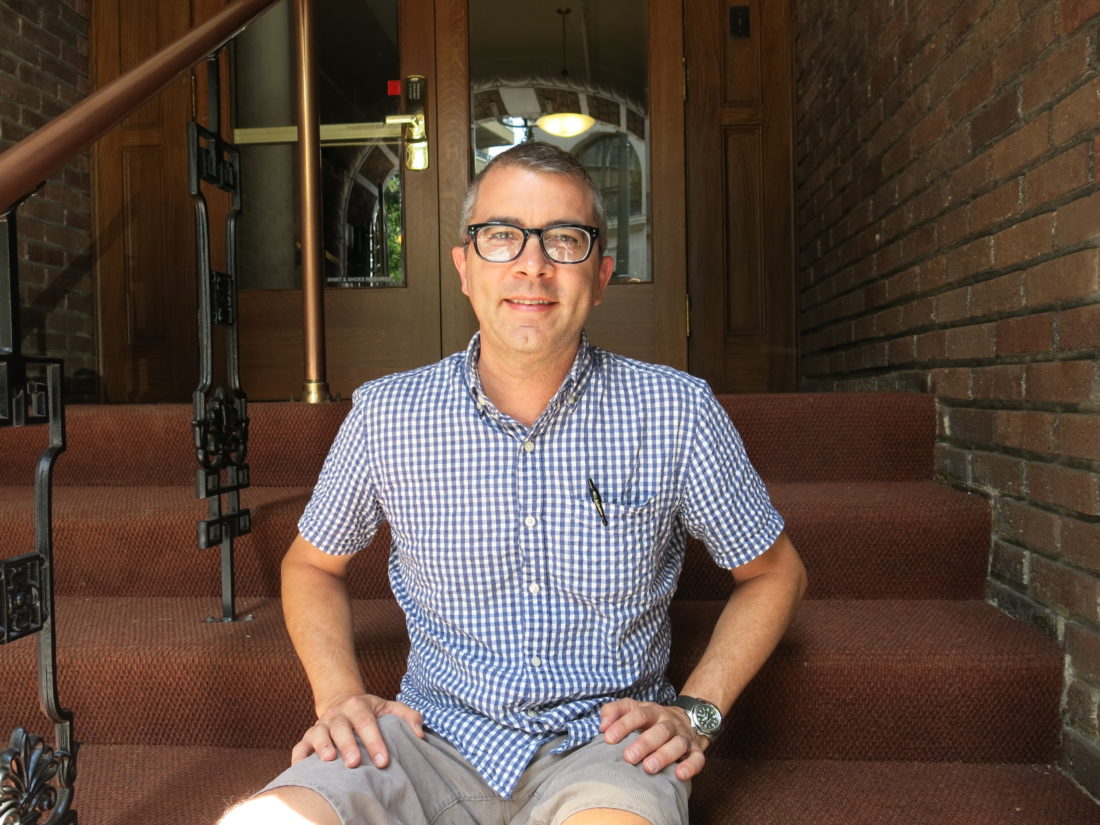Some folks collect baseball cards, others go for postage stamps. Then there’s local historian Jon Elliston, who’s spent the last 25 years patiently assembling a compelling collection of declassified government documents.
Throughout 2018, Elliston published a number of his findings in WNC Magazine, where he works as senior editor. (He’s also a contributor to and past managing editor of Xpress.) On Wednesday, Aug. 28, the writer will take his yearlong series off the page and to the lectern with a presentation titled “WNC Declassified: Local History Discoveries in Secret Documents.” The free talk will run from 6-7 p.m. in Pack Memorial Library’s Lord Auditorium.
Special collections librarian Zoe Rhine, who co-organized the event, says it’s the latest installment of the North Carolina Room’s ongoing effort to highlight lesser known aspects of the region’s history. Elliston, she says, is a frequent contributor to the library’s programs, and he has a particular knack for public speaking. “He is one of the strongest and best-informed presenters I have heard,” she notes. “You’re rarely aware that Jon is presenting: It’s more like he’s just talking.”
With his latest lecture, Elliston promises to bring “an unlikely amount of excitement stemming from paper documents.”
The subject matter seems to back up that claim: From a pro-Nazi campaign launched in Asheville during the 1930s to a Cold War spy station based in Transylvania County, the talk will highlight a number of local individuals and institutions whose influence extended far beyond the Blue Ridge Mountains.
Through the bottleneck
A native Ashevillean, Elliston caught the bug for declassified material in the early ’90s, shortly after graduating from UNC Chapel Hill. At the time, he was living in Washington, D.C., where he worked for the nonprofit National Security Archive.
“Their objective has always been to document as fully as possible the inner workings of the U.S. government, particularly in regard to national security and foreign policy issues,” Elliston explains. “But they’ve also done a lot of great work getting documents released relating to domestic matters, from the environment to various civil rights concerns.”
While at the nongovernmental agency, Elliston frequented the National Archives at College Park, which houses the CIA’s historical database. At the time, he notes, declassified material could be accessed only via a single on-site terminal, and long lines were par for the course.
“There were no thumb drives yet, so you had to print out every page you got, and the printer was constantly running out of toner,” Elliston remembers. So the government “had this bottleneck even when they were releasing” declassified documents.
Nevertheless, he made the trip regularly, for both professional and personal reasons. And he often sought out tidbits pertaining to local Asheville history, despite living nearly 500 miles away. Over time, says Elliston, interesting names and events started cropping up.
A fascist in the mountains

All five of the stories Elliston plans to share echo the current political and social climates. That’s no accident, the historian notes: His passion has always been connecting past events “to some of the issues we still grapple with today.”
In “Asheville’s Fascist,” first published in January 2018, Elliston wrote:
“When torch-bearing white nationalists marched in Charlottesville, Va., last August, leading to a murder and national soul-searching, many shocked Americans asked, ‘How could this happen here?’ Some answers might be found in the story of William Dudley Pelley, who waged a bizarre but partially potent pro-Nazi campaign from Asheville in the 1930s.”
Inspired by Adolf Hitler’s appointment as Germany’s chancellor, Pelley founded the Silver Legion of America in 1933. With a printing operation in Biltmore Village, he published material denouncing Jews and promoting white supremacy. At its peak, Elliston reports, the Silver Legion had as many as 20,000 members scattered across the country.
A few years later, Pelley entered politics, running for president on the Christian Party ticket in 1936. The campaign was a dismal failure, but Pelley continued his pro-Nazi campaign until 1942. That year, the leader of the Silver Legion was found guilty on multiple charges of sedition and sentenced to 15 years in prison.
“I think Pelley is ripe for a little reassessment,” Elliston says now. “He was a very esoteric kind of individual. … Had he not been such an oddball, I wonder if he would have gained more traction.”
Deconstructing “truth”
Relaying declassified information, notes Elliston, poses a number of obstacles. The greatest challenge, he says, is condensing complex and layered accounts into an accessible narrative.
Another hurdle is determining the accuracy of any given document. “Declassified materials are sometimes filled with misinformation,” the historian explains. In some instances, reports are infused with rumors and speculation. “It takes a bit of practice and a lot of conversations with experts and some contextualization to figure out how much stock to put in the papers that have been released thus far,” he says.
But the quest for truth also calls for integrity. “I think sometimes historians and observers go wrong when they cherry-pick a line from a secret document as though it were the gospel truth when, in fact, it might have been born inaccurate,” Elliston observes.
And then there’s the question of how “the facts” may change as new material is uncovered. Such is the case with Elliston’s ongoing research into Black Mountain College. A freewheeling, multidisciplinary hub of artistic innovation, the alternative school operated in Black Mountain from 1933-57.
During the school’s 24-year run, several faculty members and students attracted FBI scrutiny. A key reason for that, says Elliston, was the college’s embrace of refugees fleeing Nazi Germany.
He plans to share specific FBI accounts during his talk. At the same time, he stresses, “We still have a lot to learn. … I’ve been working with a bunch of biographers and other scholars. … We’re amassing a pretty good dossier on Black Mountain College that is continuing to grow.”
More to tell
Tales of espionage, nuclear war and the undoing of a presidency will round out the evening. And though some of the action took place outside of Western North Carolina, the central figures were all natives of the region.

That includes Sen. Sam Ervin Jr., a Burke County resident whose leadership role in the Senate’s investigation into the 1972 Watergate scandal roused President Richard Nixon’s ire. “This old fart is going to screw us,” the commander in chief said of Ervin during an Oval Office meeting. The quote, notes Elliston, comes courtesy of declassified documents concerning Nixon’s own secret White House audiotapes.
Stepping outside the region, says Elliston, can create opportunities to discuss broader issues such as civil liberties, government surveillance and transparency. But the majority of the talk, he says, will focus on filling in gaps in local history.
At the same time, Elliston hopes those who attend his upcoming presentation will raise additional questions and perhaps bring new information to the table. His report on the Rosman research station, he says, is a prime prospect for such amplification.
Built by NASA in 1963, the site occupies 200 acres in the little town of Rosman in southern Transylvania County. The space agency used the property to track the movements of astronauts. In 1981, however, the National Security Agency began using the high-tech infrastructure to monitor strategic communications of Soviet bloc adversaries. Today, the nonprofit Pisgah Astronomical Research Institute operates the site as an educational center.
And though the Defense Department shut down the spy station in 1995, details of its checkered past are still unknown. “It was a major local employer in a pretty depopulated county during the last 15 years of the Cold War,” Elliston points out. “There were a lot of folks who worked in that facility and had top-secret security clearances. I’m sure they have great stories to add that we haven’t heard yet.”



Before you comment
The comments section is here to provide a platform for civil dialogue on the issues we face together as a local community. Xpress is committed to offering this platform for all voices, but when the tone of the discussion gets nasty or strays off topic, we believe many people choose not to participate. Xpress editors are determined to moderate comments to ensure a constructive interchange is maintained. All comments judged not to be in keeping with the spirit of civil discourse will be removed and repeat violators will be banned. See here for our terms of service. Thank you for being part of this effort to promote respectful discussion.